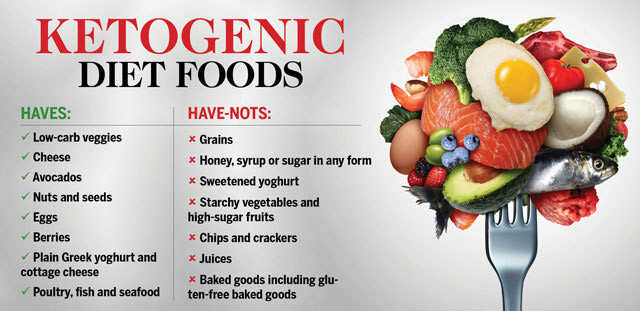What Is It Keto Diet?
keto diet is a low carb, high fat diet. It lowers blood sugar and insulin levels and shifts the body’s metabolism away from carbs and toward fat and ketones.
Who should use Keto Diet?
The keto diet could cause low blood pressure, kidney stones, constipation, nutrient deficiencies and an increased risk of heart disease. Strict diets like keto could also cause social isolation or disordered eating. Keto is not safe for those with any conditions involving their pancreas, liver, thyroid or gallbladder.
Contents
What does the Research say about Keto Diet?
The ketogenic diet (or keto diet, for short) is a low carb, high fat diet that offers many health benefits.
In fact, many studies show that this type of diet can help you lose weight and improve your health ( Source).
How Keto Diet Works

- It involves drastically reducing carbohydrate intake and replacing it with fat. This reduction in carbs puts your body into a metabolic state called ketosis.
Ketosis is a process that happens when your body doesn’t have enough carbohydrates to burn for energy. Instead, it burns fat and makes things called ketones, which it can use for fuel. Ketosis is a word you’ll probably see when you’re looking for information on diabetes or weight loss.
- When this happens, your body becomes incredibly efficient at burning fat for energy. It also turns fat into ketones in the liver, which can supply energy for the brain
- Ketogenic diets can cause significant reductions in blood sugar and insulin levels. This, along with the increased ketones, has some health benefits
4 Types of Keto Diet
Ketosis is a metabolic state in which your body uses fat for fuel instead of carbs. Modifying your diet and practicing intermittent fasting can help you enter ketosis faster. Certain tests and symptoms can also help determine whether you’ve entered ketosis.
There are several versions of the ketogenic diet, including:
- High protein ketogenic diet: This is similar to a standard ketogenic diet, but includes more protein. The ratio is often 60% fat, 35% protein, and 5% carbs.
- Standard ketogenic diet (SKD): This is a very low carb, moderate protein and high fat diet. It typically contains 70% fat, 20% protein, and only 10% carbs (Source).
- Cyclical ketogenic diet (CKD): This diet involves periods of higher carb refeeds, such as 5 ketogenic days followed by 2 high carb days.
- Targeted ketogenic diet (TKD): This diet allows you to add carbs around workouts.
Keto Diet Helps in Weight Loss
A ketogenic diet can help you lose slightly more weight than a low fat diet. This often happens with less hunger.Yes Keto diet can help you lose weight
A ketogenic diet is an effective way to lose weight and lower risk factors for disease (Source).
In fact, research shows that the ketogenic diet may be as effective for weight loss as a low fat diet (Source).
Keto diet can help for diabetes and prediabetes
The ketogenic diet can boost insulin sensitivity and cause fat loss, leading to significant health benefits for people with type 2 diabetes or prediabetes.
Diabetes is characterized by changes in metabolism, high blood sugar, and impaired insulin function .
The ketogenic diet can help you lose excess fat, which is closely linked to type 2 diabetes, prediabetes, and metabolic syndrome (Source).
Other Health benefits of Keto Diet
The ketogenic diet actually originated as a tool for treating neurological diseases such as epilepsy.
Studies have now shown that the diet can have benefits for a wide variety of different health conditions:
- Brain injuries. Some research suggests that the diet could improve outcomes of traumatic brain injuries
Cancer. The diet is currently being explored as an additional treatment for cancer, because it may help slow tumor growth. - Heart disease. The ketogenic diet can help improve risk factors like body fat, HDL (good) cholesterol levels, blood pressure, and blood sugar (28Trusted Source, 29Trusted Source).
- Alzheimer’s disease. The keto diet may help reduce symptoms of Alzheimer’s disease and slow its progression
- Epilepsy. Research has shown that the ketogenic diet can cause significant reductions in seizures in epileptic children
- Parkinson’s disease. Although more research is needed, one study found that the diet helped improve symptoms of Parkinson’s disease
- Polycystic ovary syndrome. The ketogenic diet can help reduce insulin levels, which may play a key role in polycystic ovary syndrome



